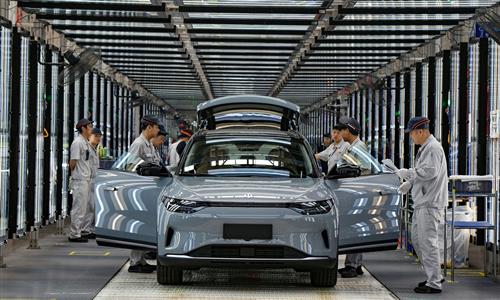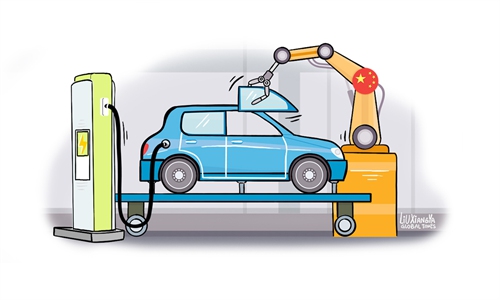
Illustration: Chen Xia/Global Times
While the EU's recent decision to raise tariffs on electric vehicles (EVs) from China has caused quite a stir in the global trade arena, this has not hindered cooperation between China and some EU countries. Instead, it draws growing attention to the critical need and potential for enhancing investment cooperation between China and the EU.Collaboration between China and Poland in the EV sector is a vivid demonstration of this investment cooperation. A joint action plan (2024-27) on strengthening China-Poland comprehensive strategic partnership said that "Both sides will support the growth of two-way investments in EVs, green development, logistics and other sectors," the South China Morning Post reported on Tuesday.
The development came days after news that Chinese automaker Geely is working with the state-backed Polish firm ElectroMobility Poland to develop an electric car that is expected to enter mass production in two years' time.
This is not Geely's first investment in Europe, but its EV cooperation this time marks an important direction for Chinese carmakers going overseas. In the face of a complex trade and geopolitical landscape, establishing factories abroad is a necessary strategy for Chinese automakers looking to expand internationally and promote Chinese brands in the global auto market.
At present, Geely, BYD and Chery have all implemented investment plans in European countries such as Poland, Hungary and Spain. These investment projects not only offer Chinese automakers fresh entry points into the European market but also generate new economic growth and employment opportunities in Europe.
It is crucial to acknowledge that while the EU's tariff decision on Chinese EVs represents a form of trade protectionism that contradicts the principle of free trade, increased tariffs could potentially incentivize Chinese automakers to expedite their investment in the EU. This is due to the fact that by establishing local production facilities, Chinese EV manufacturers can overcome tariff obstacles, enhance their integration within European supply chains, and gain greater access to the European market.
We firmly oppose such protectionist tendencies and are engaging in talks and consultations with the EU to seek a fairer and more equitable trade environment. But at the same time, it should be pointed out that trade conflicts do not hinder the active promotion of the new trend of increased investment cooperation between China and the EU. The surprise and even panic in foreign markets over China's EVs are driven by a natural reaction to new competitors. This sentiment is partly fueled by the lag in Chinese foreign investment compared to its trade growth.
In this scenario, it has become an inevitable trend that Chinese EV manufacturers will consider investing in key markets like Europe so as to establish a stronger presence in the market and localize their brand. By investing, Chinese EV manufacturers can integrate into the local industrial ecosystem, expediting the globalization process. This will not only bolster the international reputation of Chinese auto brands but also foster greater collaboration opportunities and market expansion for all parties involved. If China can access the European market more smoothly through investment, it will certainly be conducive to European companies expanding their investment in China.
Furthermore, the collaboration between China and some EU countries in EV investment not only underscores their shared interest and growth opportunities in this burgeoning sector, but also serves as a reminder of the vast potential and value that exists in the investment cooperation between China and the EU. There is sufficient room for such cooperation to expand its influence and application to various other economic fields, such as science and technology innovation, infrastructure development, financial services and other service industries.
As China-EU investment cooperation deepens and expands, it is hoped that bilateral investment could have positive impacts across a wider range of fields. Of course, achieving this goal will necessitate the collaborative efforts and wisdom of both sides, such as resuming talks on the China-EU Comprehensive Agreement on Investment.



